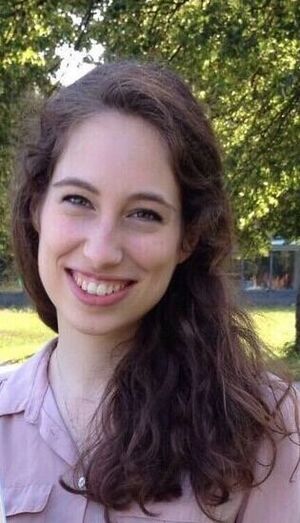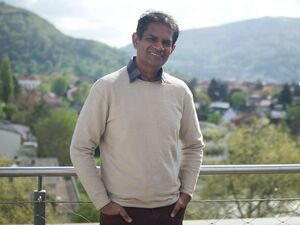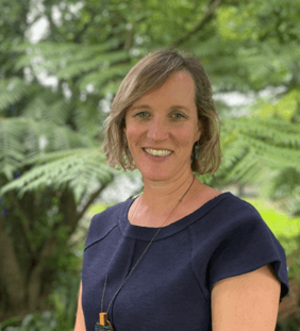-
Working Groups
- Climate Change and Health Intervention
- Climate Change, Nutrition and Health
- Climate Change, Migration and Health
- Heidelberg Planetary Health Hub (Hei-Planet)
- Climate-smart Health Systems
- Design and implementation research in global health
- Digital Global Health
- Disease Control in Disadvantaged Populations
- Epidemiology and Biostatistics
- Epidemiology of Transition
- FAIR and ethical data and sample reuse
- Field Epidemiology Research in German Public Health
- Global Child Health
- Global Health and Economics Research Group
- Global Health Diagnostics
- Global Health Policies and Systems
- Health Economics and Health Financing
- Implementation research for prevention and disease control
- Injury Epidemiology and Prevention
- Mathematical Modelling of Infectious Diseases
- Non-communicable disease (NCD) in LMICs
- Non-Communicable Diseases (NCDs) Implementation Research
- Oral Health
- Planetary Child Health
- Science Communication
- Vector Borne Diseases and Geo Health
Group leader

Bunker, Aditi PhD, MPH
Aditi is an epidemiologist and coordinates the Climate Change and Health Intervention Working Group at Heidelberg. Her research tests climate change adaptation and mitigation interventions to assess how they affect population health, environmental and economic outcomes. Using experimental and quasi-experimental designs, she conducts large-scale causal impact evaluations on interventions in the housing, urban design, infrastructure and food sectors to identify how they affect outcomes, including infectious disease. She uses novel approaches to co-design technology based solutions for populations including growth hacking, citizen science approaches and hackathons. Knowledge generated through Aditi’s research will inform governments, citizens, private sector and donors on uptake of adaptation and mitigation interventions with co-benefits for health, environment and the economy. She enjoys developing public-private partnerships and working with government to scale and enable technology transfer of proven interventions to climate-vulnerable communities.
Aditi is the recipient of multiple Horizon Europe grants and a German Science Foundation (DFG) grant. In the Horizon Europe project Food systems that support transitions to hEalthy And Sustainable dieTs (FEAST), Aditi is a principal investigator. Her contribution involves co-designing novel technology-based solutions through open innovation, scaling solutions such as community action platforms and eco-food maps and evaluating the causal impact of technologies such as the myLabel app for promoting the transition to healthier and more sustainable diets, particularly in vulnerable groups. Aditi leads a work package on evaluating local interventions for resilience to zoonotic disease in the Horizon Europe-funded project Infectious disease decision-support tools and alert systems to build climate resilience to emerging health threats (IDAlert). Here, her research tests the effectiveness of nature based solutions, citizen science tools and urban design changes (i.e., mosquito-proof drain infrastructure changes in Barcelona) on infectious disease outcomes.In Burkina Faso, Aditi leads a randomized controlled trial as part of the DFG-funded programme on climate change and health testing the effectiveness of passive housing interventions, including cool roofs and their effects on health, environment and economic outcomes in a rural, sub-Saharan African setting. Through a Wellcome Trust grant on climate change adaptation, Aditi co-leads an international, interdisciplinary team replicating and extending the cool roofs project in Hermosillo, Mexico; Ouagadougou, Burkina Faso; Ahmedabad, India; and Niue, Oceania. With a separate Wellcome Trust grant on mental health, heat and climate change, Aditi co-leads research on the direct impacts of extreme weather events on mental health in Burkina Faso, Kenya, Mozambique and South Africa. Aditi received her doctorate summa cum laude from Heidelberg University and a Master of Public Health and Bachelor of Science from Auckland University. She has worked in a policy leadership role at the Ministry of Health, New Zealand.
Program Manager

Jackson, Susan T MA, PhD
Susan is a post-doctoral researcher and a program manager for the CCHI group. Her current research includes leading the cool roofs focus group discussion analysis within and between the four REFLECT sites and other qualitative research. Before joining HIGH, she was principal investigator of Militarization 2.0: militarization’s social media footprint through a gendered lens, a multi-team five-year research grant funded by the Swedish Research Council. Her research interests include system and design thinking, methodology development and interdisciplinary approaches to problem solving. She holds a PhD in political science (international relations) from the University of Arizona.
Postdoctoral Researchers

Stiles, Pascale PhD, MSc
Pascale is a post-doctoral scientist in the IDAlert project at HIGH. She is interested in vector-borne and other infectious diseases, particularly how climate change influences their spatial distribution and interventions to prevent disease spread. Previously, she worked on highly pathogenic avian influenza introduction risk at the National Veterinary Institute of Sweden. Her PhD in Epidemiology with a Designated Emphasis in the Biology of Vector-borne Diseases from the University of California, Davis, focused on West Nile virus risk and surveillance in California. She also holds a MSc in Control of Infectious Diseases from the London School of Hygiene and Tropical Medicine and a BS in Biology and Global Health from the University of Wisconsin, Madison.
pascale.stiles(at)uni-heidelberg.de
Researchers

Elisabeth Lindner, PhD
Elisabeth is a postdoctoral data scientist and researcher working on the Horizon Europe project "Food systems that support transitions to hEalthy And Sustainable dieTs (FEAST)“ and the WEMA project on the “Impact of extreme Weather Events on the Mental health of vulnerable populations in Africa". Before joining HIGH, Elisabeth earned her PhD in Behavior and Cognition from the University of Göttingen. She has a strong background in Economics and Psychology, having studied in France, Germany, and Korea.

Prasad Liyanage, MD, PhD
Prasad is a medical doctor and epidemiologist with more than 15 years of experience as a public health specialist. He is a postdoctoral researcher at the Heidelberg Institute of Global Health, where he focuses on climate change adaptation interventions.
prasad.liyanage(at)uni-heidelberg.de

Pippa McKelvie-Sebileau, PhD
Dr Pippa McKelvie-Sebileau has a Masters in Psychology and a doctoral degree in Public Health. She has worked in research management for several years in Australia, France and New Zealand and has experience in both quantitative and qualitative research. Her PhD used system dynamics and community-based participatory research methods to improve nutrition for children and youth in regional New Zealand, identifying high rates of food insecurity and reporting on the impact of the introduction of free and nutritious school lunches. She is passionate about improving food systems for more equitable access to food that promotes health, wellbeing and environmental outcomes. She lives in France and speaks French and English.
Pippa.McKelvie-Sebileau@uni-heidelberg.de

Walsh, Fiona MIA MPH
Fiona is a researcher with the IDAlert project. She holds an MIA and MPH from Columbia University. Her research interests cover health policy and systems research, including adoption and diffusion of innovations in health systems, such as new technologies, disease control programs, and health worker initiatives.
fiona.walsh(at)uni-heidelberg.de
Associated Team @UKHD

Bärnighausen, Till MD, ScD, MSc, MSc
Till Bärnighausen is a population health researcher who focuses on three areas of research: (i) establishing the causal impacts of large-scale global health interventions – such as HIV treatment, HIV prevention, and childhood vaccination – on health, economic and social outcomes; (ii) identifying and testing innovations to improve the delivery of global health interventions through public-sector health systems, and (iii) developing new methods for applied population-based health research. He is director of the Heidelberg Institute of Global Health and principal investigator on a number of grants from a large science funders, such as the US National Institutes of Health (including five R01 grants), the European Union, the European Commission, the Alexander von Humboldt Foundation, the Wellcome Trust, the International Initiative for Impact Evaluation (3ie), Elton John AIDS Foundation, and the Clinton Health Access Initiative. He has also received research funding from Harvard, Rush Foundation, William F. Milton Fund, Andrew W. Mellon Foundation, the German Academic Exchange Service, International Development Research Centre Canada, USAID, WHO, UNAIDS and World Bank. Till also is Adjunct Professor of Global Health at the Harvard T.H. Chan School of Public Health in the US and a Senior Faculty at the Wellcome Trust’s Africa Health Research Institute (ARHI) in South Africa.
till.baernighausen(at)uni-heidelberg.de

Compaoré, Guillaume MD MSc
Guillaume is the Field Coordinator for the Cool Roofs study in Nouna, Burkina Faso. Located at the Nouna Health Research Center, a part of the National Institute of Public Health in Burkina Faso, Guillaume’s research interests include clinical trials and malaria and public health.

Jani, Anant PhD
Anant is a principal investigator in the Horizon Europe project Food systems that support transitions to hEalthy And Sustainable dieTs (FEAST) at HIGH and a Research Fellow at the University of Oxford. He currently works on understanding how we can improve population health through social prescriptions and by addressing social determinants of health. Prior to his position at the University of Oxford, Anant worked in Europe and the Middle East to help healthcare systems within these countries to focus more on value-based healthcare. Anant has a PhD in immunology from Yale University.
anant.jani(at)uni-heidelberg.de

Rocklöv, Joacim PhD
Joacim is an epidemiologist, modeler and data scientist conducting interdisciplinary research within the field of climate change and infectious diseases. He obtained his PhD from Umeå University, Sweden. In the year 2021 he was awarded an Alexander von Humboldt Professorship endowed by the The Federal Ministry of Education and Research in Germany. The chair at Heidelberg University focuses on applying data science and modelling to the area of One Health and climate change. It functions as a bridge between the Heidelberg Institute of Global Health (HIGH) and the interdisciplinary Centre for Scientific Computing (IWR) at Heidelberg University. In 2018 Joacim was awarded the Albert II of Monaco and the Institute Pasteur Prize for research on environmental change and infectious diseases. Prof. Rocklöv is the principal investigator and co-PI of several major research projects within the area of climate change and infectious diseases and pandemic preparedness. He is a Guest Professor at Umeå University in Sweden
joacim.rockloev(at)uni-heidelberg.de

Sewe, Maquines PhD
Maquines is a statistician with a PhD in Epidemiology. He is focusing on statistical modelling of climate and disease relationships with a special interest in Global Health.
Associated Members
Arisco, Nicholas PhD (environ. health)
Harvard TH Chan School of Public Health
Harvard University (USA)
Bernstein, Aaron MPH, MD
Harvard TH Chan School of Public Health
Harvard University (USA)
aaron_bernstein(at)hms.harvard.edu
Bullen, Chris MB ChB, MPH, PhD, FNZCPHM, FAFPHM
National Institute for Health Innovation
University of Auckland (New Zealand)
Bunkley, Noah MD
National Institute for Health Innovation
University of Auckland (New Zealand)
noah.bunkley(at)auckland.ac.nz
Jonathan Buonocore, MS, ScD
School of Public Health
Boston University (USA)
jj.buono(at)bu.edu
Laurent, Jose Guillermo (Memo) Cedeño MSc, ScD
Environmental and Occupational Health Sciences Institute (EOHSI)
Rutgers University (USA)
Haines, Andy MBBS, MD, FRCGP, FFPHM, FRCP, FMedSci
Dept of Public Health, Environments and Society & Dept of Population Health
London School of Hygiene and Tropical Medicine (UK)
Harp, Gabriel MA, MFA
Taubman College of Architecture + Urban Planning
University of Michigan (USA)
Mavalankar, Dileep MBBS, MD, MPH, PhD
Indian Institutes of Public Health (IIPHG) Gandhinagar (India)
Sié, Ali PhD, MD
Centre de Recherche en Santé de Nouna (Burkina Faso)
Soura, Abdramane PhD
Institut Superieur Sciences de la Population (Burkina Faso)
Tasmania, Gaylene MSc
Ministry of Social Services
Niue Government (Niue)
Gaylene.Tasmania(at)mail.gov.nu
Tiwari, Abhiyant MPH
Natural Resources Defense Council (NRDC) (India)
Tukuitonga, Collin MD, MPH
Faculty of Medical and Health Sciences, Population Health & Centre for Pacific and Global Health
University of Auckland (New Zealand)
collin.tukuitonga(at)auckland.ac.nz
Vargas-Lopez, Juan Manuel PhD
División de Ciencias Biológicas y de la Salud
Universidad de Sonora (Unison) (Mexico)
Woodward, Alistair MB BS, MMedSci, PhD, FNZCPHM
Faculty of Medical and Health Sciences, Epidemiology & Biostatistics
University of Auckland (New Zealand)
a.woodward(at)auckland.ac.nz
Yacouba Compaoré, PhD
Institut Superieur Sciences de la Population (Burkina Faso)
Daniel Espejel, PhD
Hermosillo Institute of Technology
daniel.espejelb(at)hermosillo.tecnm.mx
Collins Iwuji, PhD
Africa Health Research Institute
Jose Hoyo Montaño, PhD
Hermosillo Institute of Technology
jose.hoyom(at)hermosillo.tecnm.mx
Idrissa Ouili, PhD
Institut Superieur Sciences de la Population (Burkina Faso)
Jama’l Talagi-Veidreyaki, MA
Government of Niue and Niue Eco-Logic Consultancy
Frank Tanser, PhD
Stellenbosch University (South Africa)
-
Working Groups
- Climate Change and Health Intervention
- Climate Change, Nutrition and Health
- Climate Change, Migration and Health
- Heidelberg Planetary Health Hub (Hei-Planet)
- Climate-smart Health Systems
- Design and implementation research in global health
- Digital Global Health
- Disease Control in Disadvantaged Populations
- Epidemiology and Biostatistics
- Epidemiology of Transition
- FAIR and ethical data and sample reuse
- Field Epidemiology Research in German Public Health
- Global Child Health
- Global Health and Economics Research Group
- Global Health Diagnostics
- Global Health Policies and Systems
- Health Economics and Health Financing
- Implementation research for prevention and disease control
- Injury Epidemiology and Prevention
- Mathematical Modelling of Infectious Diseases
- Non-communicable disease (NCD) in LMICs
- Non-Communicable Diseases (NCDs) Implementation Research
- Oral Health
- Planetary Child Health
- Science Communication
- Vector Borne Diseases and Geo Health
